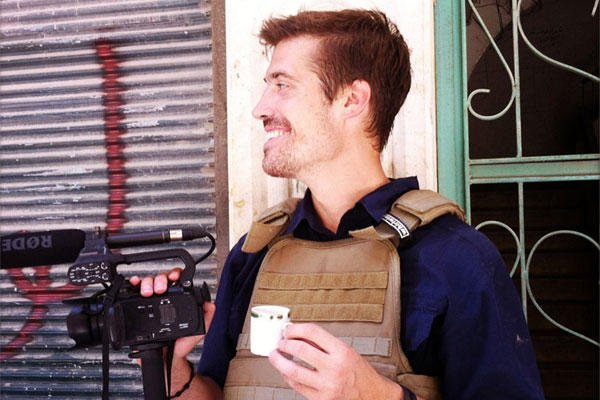In the days before journalist James Foley was brutally beheaded by a member of the Islamic State militant group, an e-mail sent to Foley's family threatened his execution in "vitriolic" terms, the CEO of the international news service he had worked for said Wednesday.
Philip Balboni told a news conference that the e-mail, which was received sometime last week, did not contain any demands, in contrast with previous missives dating back to last fall.
Balboni said the company had hired an international firm shortly after Foley disappeared in November 2012, and the New Hampshire native was located in September 2013. Balboni added that Foley was always kept in Syria, though his captors moved him around often.
Foley was abducted in northern Syria while covering that country's civil war and had not been heard from since.
On Tuesday, Islamic State, the militant group formerly known as ISIS, released a video showing a militant beheading Foley in apparent response to U.S. airstrikes against militant positions in Iraq. At the end of the video, the militant is shown threatening to behead another missing American journalist, Steven Sotloff.
Citing a representative of Foley's family and a former hostage, the New York Times reported that ISIS militants had pressed the U.S. to pay a $100 million ransom in exchange for Foley's release. That demand was refused. The Times also reported that ISIS is holding at least three other Americans hostage, including Sotloff, and has threatened to kill all of them if their demands are not met.
In addition to money, the militants' demands also reportedly included prisoner swaps. One prisoner specifically named in the Times report is Aafia Siddiqui, a neuroscientist with ties to Al Qaeda who has been imprisoned in Texas since 2010 after a conviction for attacking U.S. agents in Afghanistan.
In a rare move Wednesday, the Pentagon revealed that U.S. special operations forces had attempted to rescue hostages held by Islamic State, including Foley, earlier this summer.
Pentagon spokesman Rear Admiral John Kirby said in a statement that the mission had targeted a "captor network" inside the militant group, and included air and ground elements, but was unable to locate the hostages.
On Thursday, the U.S. military continued to launch airstrikes on ISIS in the vicinity of the Mosul Dam, which was overtaken from the militant group by Kurdish Peshmerga forces earlier this week.
The six strikes destroyed or damaged three ISIS Humvees, a vehicle and several IED emplacements, U.S. Central Command said in a statement.
Meanwhile, new details were being reported in the British press about the identity of the militant who beheaded Foley in the video. American and British intelligence officials were working to firmly identify the man, who speaks in the video with a distinct British accent and is believed to be from London or southeast England.
A former hostage told The Guardian that the man was the head of a group of three British militants whose main job is to guard foreign captives in the northern Syrian city of Raqqa, an ISIS stronghold.
The hostage said the man called himself "John" and described him as intelligent, educated, and devoted to radical Islamic teachings. The hostage said that his fellow captives referred to their three British overlords as "The Beatles."
The Guardian also reported that "John" is a point man for hostage negotiations and has had discussions about possible ransoms with families of several foreign nationals via Skype.
The British government has estimated that up to 500 citizens of that country have traveled to Syria and Iraq to join up with ISIS and other militant groups since the beginning of the Syrian civil war in 2011.
British intelligence officials also reportedly believe that those nationals have developed into particularly dangerous fighters, willing to carry out suicide attacks and, as in the case of Foley's death, beheadings. According to The Daily Telegraph, approximately half of those 500 have returned to the United Kingdom.
The Associated Press contributed to this report.



























